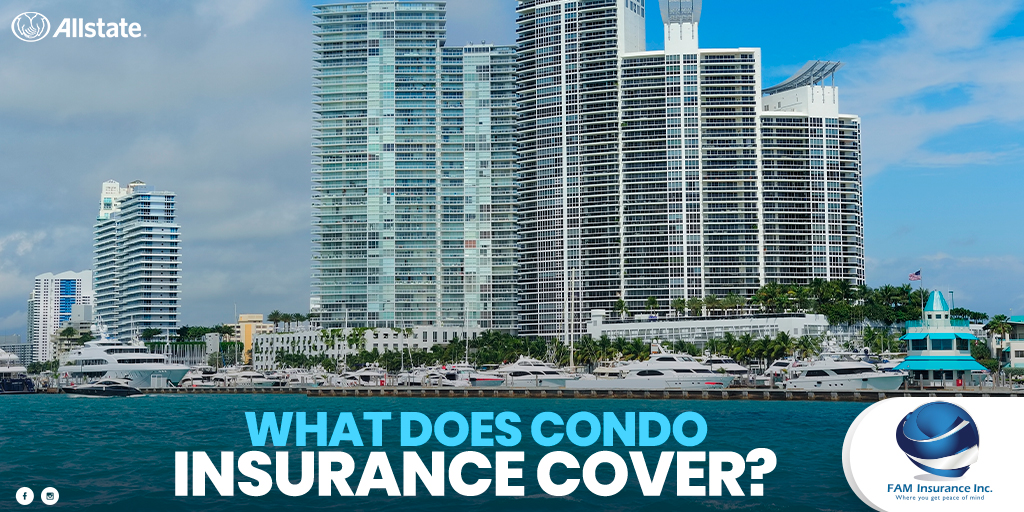What does condo insurance cover?
Condo insurance typically includes a few standard coverages to help protect you, your condo unit and your belongings. Here’s a look at how these coverages work:
Personal liability coverage
If someone is accidentally injured while visiting your condo and you are at fault, this coverage may help you pay for related legal expenses or your guest’s resulting medical bills.
Guest medical coverage
If a guest is injured at your home, guest medical coverage may help pay for related medical expenses even if you are not at fault.
Building property protection
This type of coverage typically helps pay for repairs to the walls of your condo unit and its interior, which could include items such as built-in bookcases and fixtures, if damage is caused by a covered peril.
Personal property coverage
Belongings such as electronics, appliances, furniture and clothing are typically included under personal property coverage. If they are stolen or damaged in a covered claim, this coverage may help pay to repair or replace them.
Condo owners can typically choose from different types of personal property coverage, which determine how much your policy will reimburse you after a covered loss. They include:
- Actual cash value, which typically pays you for the depreciated value of your damaged belongings.
- Replacement cost coverage, which does not take depreciation into account. This coverage helps reimburse you for the difference between the actual cash value of your belongings and what you paid to repair or replace them.
Keep in mind that each coverage comes with a limit, which is the maximum amount you can be reimbursed for a covered claim. You may also need to pay a deductible before your coverage kicks in.
Condo association coverage
It’s also important to understand what is covered by your condo association’s insurance policy, sometimes referred to as the master policy. Your association’s policy may help cover areas such as the boiler room and the roof, as well as hallways and other shared spaces, including the common rooms and swimming pool.
In some cases, the master policy may cover the structure of your own condo unit, including the walls and the floors, the III says. Other master policies might provide coverage for your unit’s original construction and fixtures, while others might cover only bare walls, ceilings and floors, according to the III. The terms of the master policy can affect your own insurance coverage of the unit. It’s a good idea to brush up on what protection your condo association has in place so that you know what types of coverage your personal policy should provide.
Keep in mind there are many condo associations in the U.S., allowing for plenty of variations in insurance policies. The III suggests reading your association’s bylaws to learn what parts of your home are covered by the master policy and which parts you will need to insure on your own.
Other protections
Many insurance providers offer optional coverage you can purchase for occurrences not covered by a standard condo insurance policy. For instance:
Loss assessment coverage
If your condo association issues a special assessment, in some cases this coverage may help cover your share. For example, if a fire damages a common area, this coverage may help pay for your part of the bill.
Flood insurance
Flood damage is typically not covered by a standard condo policy. Most flood insurance policies are issued through the National Flood Insurance Program. In some cases, you may even be required by your mortgage lender to purchase flood insurance, according to the program.
Umbrella insurance
For additional liability protection, you may want to consider investing in a separate personal umbrella policy. This kind of policy goes into effect when you reach the limit of your condo’s liability coverage and can help you pay for large liability claims or judgments. It may also help provide coverage if you are sued for libel or slander.
Endorsements
Additional personal property coverage, such as scheduled personal property, is typically available for an additional cost. For example, while a standard condo policy typically caps coverage for theft of jewelry at $1,000 or $2,000, scheduled personal property coverage may provide additional coverage for those items. Scheduled personal property also typically provides coverage for additional risks.
When it comes to insurance for your condo unit, you should make sure you have the coverage that fits your needs. Your insurance provider can help you tailor a condo insurance policy that’s right for you.
Source: Allstate

